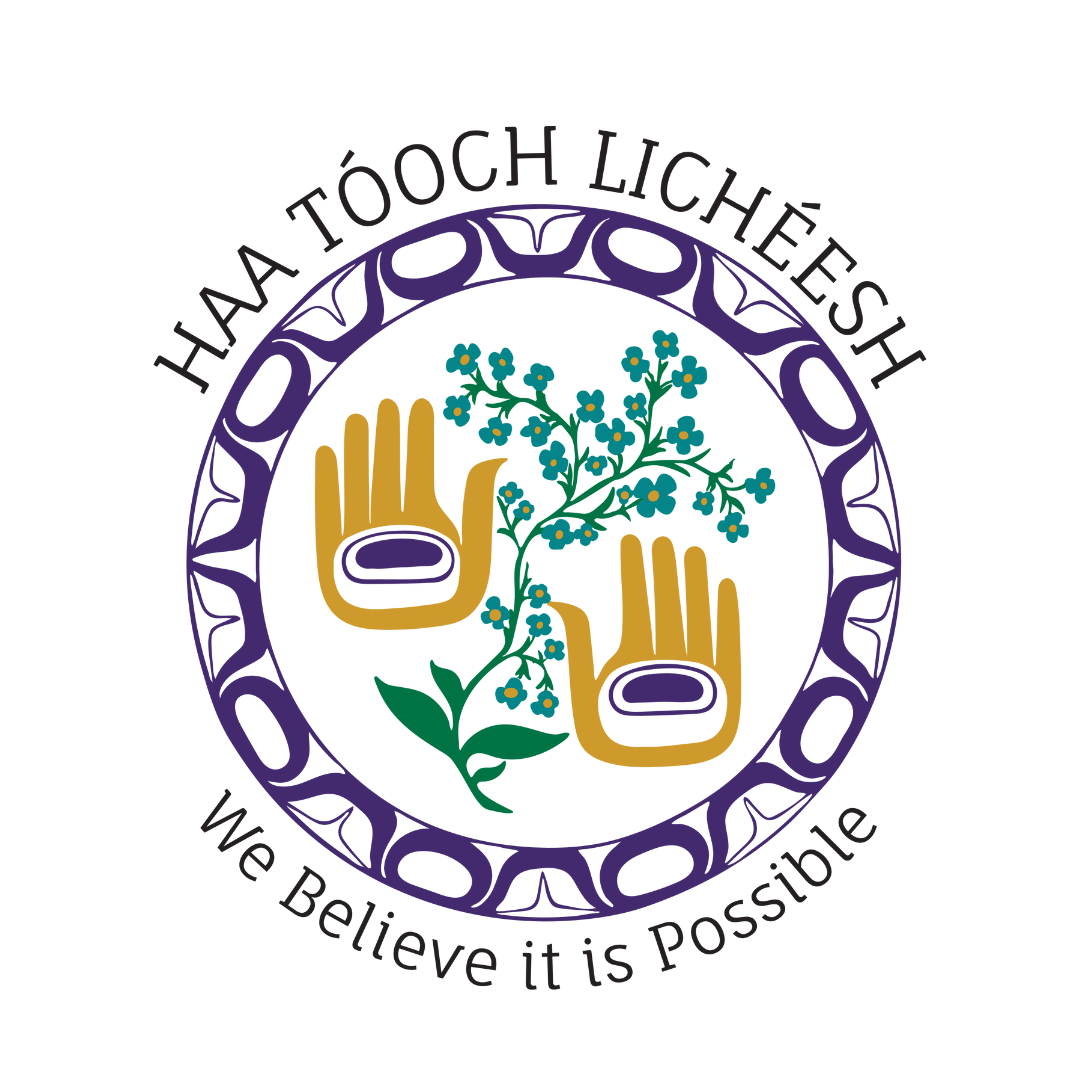Our Purpose
Haa Tóoch Lichéesh—”We believe it is possible”—is a grassroots coalition rooted in an Indigenized worldview, bridging belonging across identities and committed to the framework and practice of healing justice. Grounded in Lingít Aaní and guided by culture, we work across Juneau and Southeast Alaska to prevent violence, promote healing, and dismantle systems of racial, gender-based, ableist, and colonial oppression. Through trauma-informed, survivor-centered approaches, our programs, projects, and partnerships aim to create the conditions for healing and wellness from the inside out—nurturing sustainable, just, and interdependent communities. Every day, we recommit to collective care, accountability, and unity, recognizing both the challenge and the urgency of this work in the face of historical and ongoing harm.
Mission & Vision: We envision a socially just community in a reciprocal, healthy relationship with the land and with each other. Guided by the wisdom of our ancestors, we reckon with injustice and commit to healing and liberation, while honoring our interdependence. Together, we are imagining and creating a community free from violence.

History

In 2003, the Juneau Violence Prevention Coalition (JVPC) was created to bring together local partners in creating and implementing a community-driven strategic plan to prevent violence and promote healthy relationships. As our work evolved, it became clear that truly transformative violence prevention must be rooted in cultural accountability and led by those most impacted.
In 2017, following years of deep relational groundwork and in the wake of personal and collective tragedy, the coalition restructured. Over a year of deep listening circles, our Executive Director and Board President reimagined the coalition through a lens of regenerative conflict, Indigenous values, and decolonial practice. The coalition reemerged as the Haa Tóoch Lichéesh Coalition in 2018.
In 2024, Haa Tóoch Lichéesh was formally founded as an independent 501(c)(3). Today, we are forging a new path that centers community voice, relational leadership, and the restoration of healthy systems. As a coalition, our strength lies in relationships. With over 30 partner organizations—from tribal governments and grassroots groups to schools, local businesses, and regional entities—we’re working together toward a shared vision: a Southeast Alaska free from violence. Our model centers collaboration, mutual accountability, and collective care—anchored in relationships and rooted in culture.
Annual Report
Looking back at July 2024 – June 2025. If you have any questions or comments on what you see inside, please reach out! Our email address is info@htlcoalition.org.
Areas of Work



Nurturing a Community of Care for a Collective Future
Organizational Learning and Transformation
- Build and strengthen a strong, interconnected network for healing justice across SE AK.
- Facilitate cross-sector learning and unlearning.
- Support organizations in developing accessible, inclusive, and actively anti-racist practices, policies, programs.
- Identify funding mechanisms and partnership opportunities that sustain long-term, regional healing justice initiatives.
Healing Through Culture, Identity, and Belonging
Cultivating Healers and Healing Spaces
- Convene healers and leaders to co-create regional healing-centered leadership and accountability strategies.
- Invest in coalition members and staff through professional development, training, and capacity-building as healers and leaders.
- Expand access to programs that foster healing through culture and belonging, prioritizing those most impacted by harm.
- Create accessible spaces that uplift safety, well-being, visibility, and joy.
Weaving our Voices; Honoring Our Relations
Truth Telling and Accountability
- Lead community-driven truth-telling, reparations, and healing efforts.
- Expand community dialogues on racial justice, Indigenous sovereignty, and historical accountability.
- Develop and distribute tools for community lead dialogues and workshops centered on racial equity, relationship building, accountability, and healing.
- Train community members, educators, and justice practitioners to integrate restorative and transformative justice practices into broader community structures.
Theory of Change
No tree grows alone, independent of a larger forest. We honor our interconnectedness and understand that all of the work we do involves transformation and change from the inside out, beginning with ourselves. While on this journey, we have identified that our collective work spans across these areas as outlined below:
Healing and Transformation
Doing inner work is necessary to do the outer work. We will prioritize our own healing, wellness, and full expression of our authentic selves. We start here.
Centering Relationships, Working Across Generations
Building community connectedness and a community of care through the coalition. We will create intentional spaces of belonging that are intergenerational, inclusive, and regenerative to sustain and support each and every one of us.
Learning and Unlearning
We will commit to an ongoing journey of self-discovery and practice within areas that inspire, nourish, and challenge what we already know. We also recognize the work is beyond simply shifting our moral consciousness and needs to be oriented towards action.
Remembering the Past to Build a Collective Future
Changing systems of oppression through legal, policy, & institutional advocacy. We will look to our ancestors and those most impacted by violence to build a future for all.
Our Logo

“The Haa Tóoch Lichéesh Coalition addresses social justice issues within our community and works to transform individual, institutional, and systemic inequities. With this in mind, I have worked to create a logo that embodies the values of the coalition. A few of these values are: lifting one another up, healing, equality, decolonizing, respect, and transforming.
The purple band with U shapes and Ovoids represents unity in the face of domestic violence awareness.
The golden hands represent healing, protection, and the support that comes from holding one another up.
Between the hands are forget-me-not flowers, which represent the growth and transformation that will take place in the light of healing, protection, and support for all of those who are involved. Forget-me-nots, not only represent the growth of this coalition but the name serves as a reminder to never forget those who are affected by social injustices.”
T’saak Ka Juu Andrea Cook, Hydaburg & Juneau Alaska
